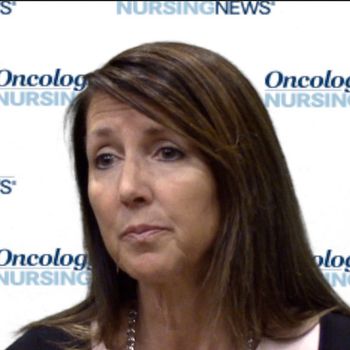
Genetic testing has come a long way in cancer care, but not all genetic tests are as defentive as some would have you or your patients beleive.

Genetic testing has come a long way in cancer care, but not all genetic tests are as defentive as some would have you or your patients beleive.

A certified genetic counselor discusses the role of genetic testing in gastrointestinal cancers.

The frontline combination of nivolumab (Opdivo) and ipilimumab (Yervoy) showed a robust and durable clinical benefit in patients with metastatic colorectal cancer (mCRC) whose tumors are microsatellite instability–high (MSI-H)/mismatch repair deficient (dMMR)—a population with a historically poor prognosis, said Heinz-Josef Lenz, MD, FACP.

While the US Preventative Services Task Force expanded their recommendations of who should be tested for BRCA mutations, there are still issues left unaddressed, according to one expert.

Circulating tumor DNA (ctDNA) monitoring is clinically valid in predicting whether patients with unresectable, metastatic BRAF-mutant melanoma will benefit from dabafenib (Tafinlar) alone or in combination with trametinib (Mekinist).

Molecular testing has led to monumental strides in the field of ovarian cancer, offering women with the disease more personalized treatment options.

Liquid biopsies and other novel techniques have the potential to change the bladder cancer space. However, unanswered questions remain.

While self-reported family cancer history is vital to screen individuals for hereditary cancer risk, its documentation tends to be lacking.

Patients with higher tumor mutational burdens tended to be more likely to be depressed, according to recent research.

The results of genetic testing could have major implications for patients with breast cancer and their families.

In non–small cell lung cancer (NSCLC), KRAS G12 mutations have been historically difficult to target, and research efforts dedicated to the development of effective targeted therapies for NRG1 fusions have not been successful. However, several biopharmaceutical companies are in the early stages of addressing that challenge, explained Sai-Hong I. Ou, MD, PhD.

Genetic and genomic testing are becoming more popular and useful in the cancer space.

Investigators are working on expanding immunotherapy use for this patient population, and genetic testing will be more important than ever.

While Lynch syndrome may be more common than originally thought, research continues to move forward to improve the outcomes of this patient population.

Genetic testing can be very beneficial to patients and their families. However, some people are still unsure about having it done.

Although Minority Health Awareness Month is drawing to an end, the fight for equity in healthcare isn’t over.

The point-of-care model was proven to work better than the referral model when it came to ensuring that patients undergo the genetic screening that they needed.

Oncology nurses are important team members when it comes to counseling patients and their families about hereditary cancers, according to Michele Settelmyer, APN, MSN, WHNP-BC, of the Saint Frances Medical Center.

Preimplantation genetic diagnosis allows women of childbearing age to select embryos that do not have genetic mutations.



A guide for oncology nurses on navigating the ever-growing field of direct-to-consumer genetic testing.

Hematologists may have the ability to determine acute myeloid leukemia (AML) subtype based on genetic analysis of blood samples in 7 days or less, a process that could soon be an integral part of diagnosing and treating this patient population, according to Amy Burd, PhD.

To receive payment for counseling and increase access to services, a new bill has been introduced so that genetic counselors receive payment for counseling Medicare beneficiaries.

The acceptance of next-generation sequencing (NGS) platforms and cell-free DNA (cfDNA) have enabled oncologists to more specifically target genetic mutations in the treatment of patients with non–small cell lung cancer (NSCLC), according to Benjamin P. Levy, MD.

The FDA has granted an accelerated approval to larotrectinib (Vitrakvi) for the treatment of adult and pediatric patients with solid tumors that have an NTRK gene fusion without a known acquired resistance mutation, are metastatic or where surgical resection is likely to result in severe morbidity, and have no satisfactory alternative treatments or that have progressed following treatment.

With the inception of its Precision Cancer Therapies Program, the Ochsner Cancer Institute has been able to expand availability of early phase clinical trials to patients who might otherwise have had to drive up to 5 or 6 hours to participate in one.

There is an increasing need for board-certified genetic counselors in the United States, says Stephanie A. Cohen, MS, LCGC, and she is looking to nurses to help improve patient access to hereditary cancer risk assessment and genetic testing.

Patients with advanced cancers associated with NTRK gene fusions showed an 80% objective response rate (ORR) with larotrectinib, a TRK inhibitor, according to pooled results from 3 small trials.

This article reviews the types of genes included in multigene panels for breast cancer, and the risks associated with those genes.